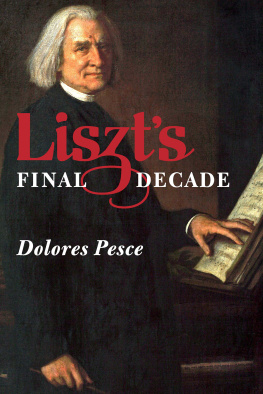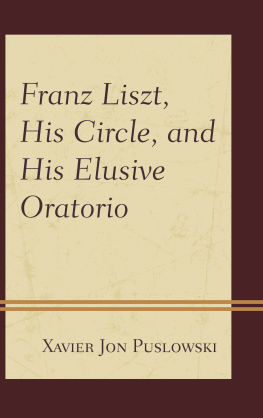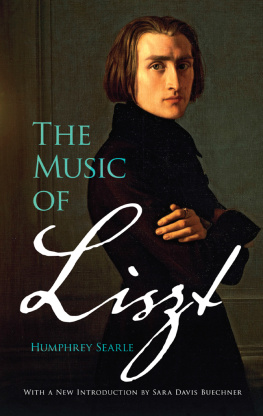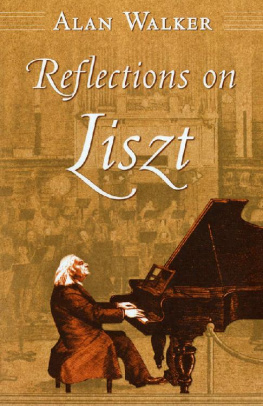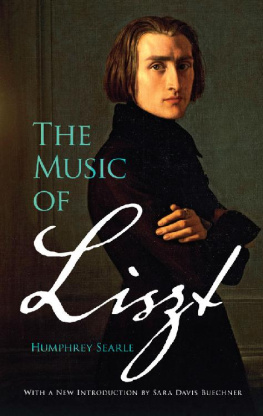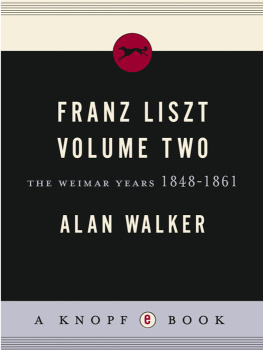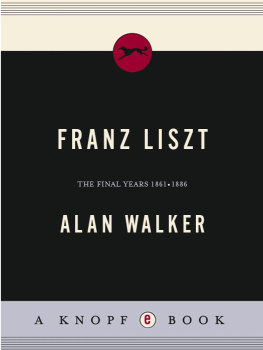Liszts Final Decade
Toward the end of his life Franz Liszt maintained extensive correspondence with two women who were at the time his closest confidantes, Carolyne von Sayn-Wittgenstein and Olga von Meyendorff. Liszt wrote to them regularly, expressing his intimate feelings about personal and career events and his conflicted self-image as a celebrated performer but underappreciated composer. Absent a diary, the letters offer the most direct avenue into Liszts psyche in his final years.
Liszts Final Decade explores through these letters the mind and music of one of the nineteenth centurys most popular musicians, providing insight into Liszts melancholia in his last years and his struggle to gain recognition for his music yet avoid criticism. The exchange indicates that Liszt ultimately resolved his inner conflict through a personally constructed Christian moral philosophy that embraced positive resignation to suffering, compassionate love, and trust in a just reward to come. The book also examines how Liszts late sacred compositions affirm the yielding of suffering to joy and hope. Significantly, Liszt viewed these works, commonly overlooked today, as a major part of his compositional legacy. This volume thus challenges the idea of a single late Lisztian style and the notion that despair overwhelmed the composer in his final years.
Dolores Pesce is the Avis Blewett Professor of Music in Arts and Sciences at Washington University in St. Louis.
The Liszt that emerges from the pages of Dolores Pesces account of his last decade is admirable no surprise and likeable as well. If anyone still believes that Liszts religion was a pose, that he took his minor clerical orders as a kind of publicity stunt, Pesces book should put that notion to rest. The analysis is convincing. TIMES LITERARY SUPPLEMENT.
The University of Rochester Press has been publishing significant books about Liszt lately. Here is a book that captures and deepens the complex image of the aging Liszt in an admirable fashion. A highly elaborate scholarly study of the life and works of a composer whose final years had not been described as thoroughly and perceptively before. LISZT BULLETIN [Albert Brussee].
The topic of Liszts late years has long been subject to uninformed conjecture, hagiographic hyperbole, and ideological posturing. With methodological acumen and critical flair, Dolores Pesce successfully unpacks the dense portrait of the composer and his music in Liszts Final Decade , bringing both the public and private Liszt to life. Particularly welcome are the close readings of Liszts late correspondence, the detailed coverage of his late religious music, and the reconstruction of his self-image. This is an important book. Jonathan Kregor, author of Liszt as Transcriber and editor of the Journal of the American Liszt Society .

Eastman Studies in Music
Ralph P. Locke, Senior Editor
Eastman School of Music
Additional Titles of Interest
Analyzing Wagners Operas: Alfred Lorenz and German Nationalist Ideology
Stephen McClatchie
The French Symphony at the Fin de Sicle:
Style, Culture, and the Symphonic Tradition
Andrew Deruchie
Good Music for a Free People:
The Germania Musical Society in Nineteenth-Century America
Nancy Newman
Gyrgy Kurtag: Three Interviews and Ligeti Homages
Balint Andras Varga
In Search of New Scales: Prince Edmond de Polignac, Octatonic Explorer
Sylvia Kahan
Lies and Epiphanies: Composers and Their Inspiration from Wagner to Berg
Chris Walton
Liszts Transcultural Modernism and the Hungarian-Gypsy Tradition
Shay Loya
Mendelssohn, Goethe, and the Walpurgis Night:
The Heathen Muse in European Culture, 1700 1850
John Michael Cooper
Pentatonicism from the Eighteenth Century to Debussy
Jeremy Day-OConnell
Schubert in the European Imagination , Volumes 1 and 2
Scott Messing
A complete list of titles in the Eastman Studies in Music series
may be found on our website, www.urpress.com .
To Bill and Helen
Contents
Illustrations
Examples
Excerpts from the NLE are reproduced with permission from the publisher, Editio Musica Budapest.
Figures
Tables
Acknowledgments
I wish to thank my home institution, Washington University, for granting me a sabbatical and financial support to complete the research and writing of this book. I am also extremely grateful for the invaluable assistance of staff members of the Washington University Libraries: Lindsey Derrington, Mark Scharff, Brad Short, Betha Whitlow, and Micah Zeller.
I gratefully acknowledge the cooperation of the institutions which house the letters that serve as primary evidence for this study: the Weimar Goethe- und Schiller-Archiv for Liszts letters to Carolyne von Sayn-Wittgenstein, and Harvard University Libraries for Liszts letters to Olga von Meyendorff. At the former, Evelyn Liepsch always responded graciously to my requests, as did Virginia Danielson and Liza Vick at the latter.
I wish to thank the following individuals who assisted me in obtaining permission to use images and musical excerpts: Stella Calvert-Smith of akg-images, London; Liz Kurtulik of Art Resource, New York; Meredith D. Sutton of the Blanton Museum of Art, Austin; Anita Wilke of Breitkopf & Hrtel, Wiesbaden; Antal Boronkay and Mrton Kerkfy of Editio Musica Budapest; Dra Csords of the Hungarian National Museum; Zsuzsanna Domokos, director of the Franz Liszt Memorial Museum, Budapest; Sandra Haupt of Klassik Stiftung Weimar, Herzogin Anna Amalia Bibliothek; David R. Daly and Christine Wirth of the Longfellow HouseWashingtons Headquarters, NHS; John Powell of the Newberry Library, Chicago; and Pauline Chapelain of Parisienne de photographie.
I gratefully acknowledge those who gave me valuable feedback during the research and writing of this book. First and foremost, I thank my friend and colleague Craig Monson, who always stood ready to talk through ideas with me. James Deaville, Nicolas Dufetel, Mria Eckhardt, Ken Hamilton, Shay Loya, Michael Short, Steve Smith, and R. Larry Todd provided helpful information and comments. My particular thanks go to Jonathan Kregor for his evenhanded criticism in his role as reader for the press.
I want to single out three people who assisted me in special ways: my friend Hellmut Fleckseder carried out research for me in Vienna; Music Department staff member Kim Daniels helped with special typescript formatting issues; and my research assistant Liza Dister lent her keen eye and intellect to both the format and contents of the manuscript. They all graciously gave of their time, as did Seth Graebner, Hugh Macdonald, and Gerhild Williams, to whom I turned for assistance with the volumes translations, which are mine, unless otherwise stated. I also extend my thanks to Scott Perkins who prepared the music examples with great skill and care, and to Emily Kilpatrick, the manuscript copyeditor, and Marilyn Bliss, who prepared the index.
I extend my deep appreciation to the University of Rochester Press staff for their assistance in producing this volume: Sonia Kane, editorial director; Ryan Peterson, managing editor; Julia Cook, assistant editor; and Tracey Engel, production editor. I am particularly grateful to Ralph Locke, as series editor, for his unflagging support of this book.
Finally, I thank my family and friends who offered encouragement and love throughout the course of this project.

